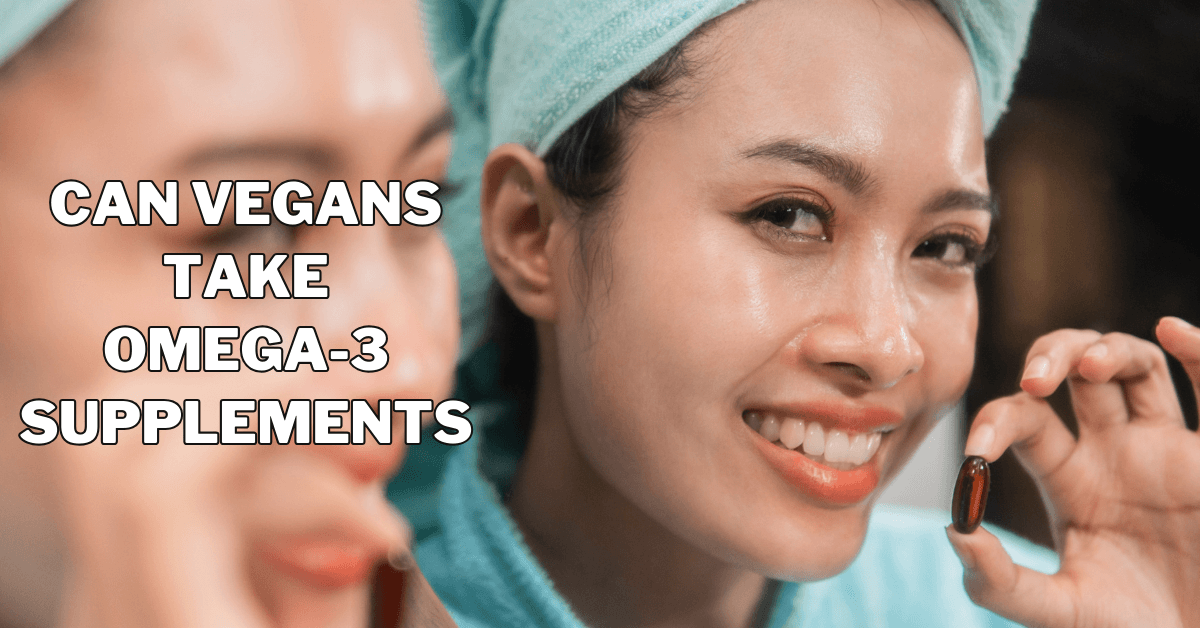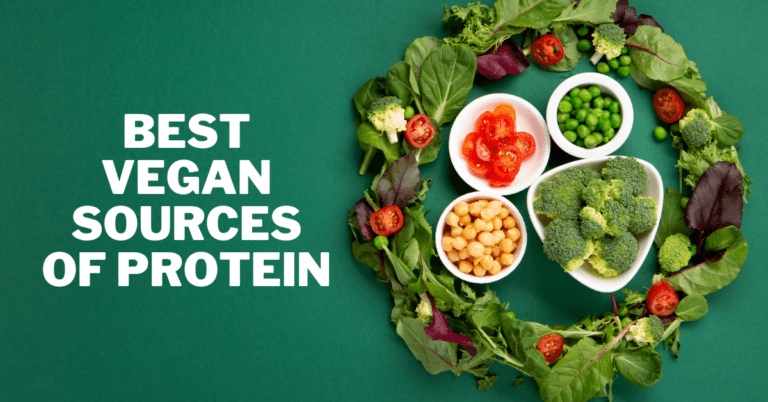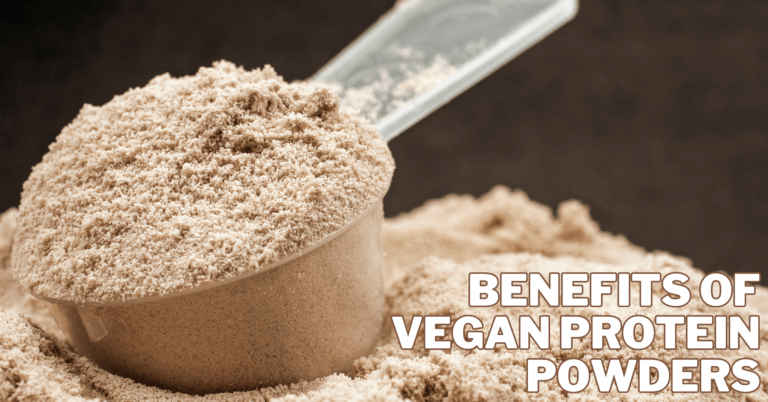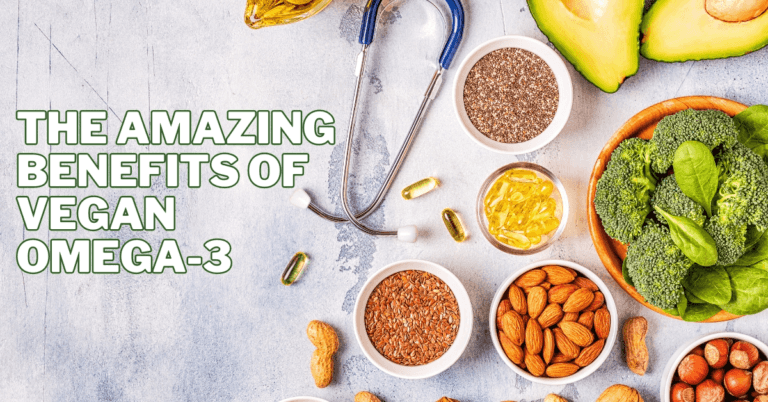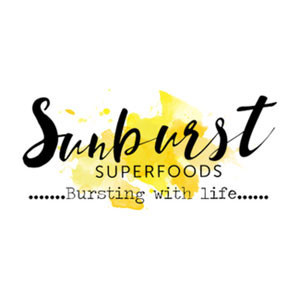Can Vegans Take Omega-3 Supplements
Can Vegans Take Omega-3 Supplements
Eating vital nutrients, particularly omega-3 fatty acids, is regularly examined in pursuing a balanced and health-conscious vegan lifestyle.
Omega-3 fatty acids are widely recognized for their numerous health benefits, which include improving cognitive performance and supporting heart health.
This post examines the nuances of omega-3 supplementation for vegans, including what options are available, how effective they are, and how crucial it is to include these supplements in a plant-based diet.
By addressing common concerns and shedding light on the potential benefits, we aim to provide valuable insights for vegans navigating the nuanced landscape of omega-3 supplementation.
Whether you're a seasoned vegan or new to plant-based living, understanding the role of omega-3s and the feasibility of supplementation is crucial for maintaining optimal health and well-being.

What Are Vegan Omega-3 Supplements?
Vegan omega-3 supplements are dietary supplements designed for individuals following a plant-based or vegan lifestyle who seek to ensure adequate intake of essential omega-3 fatty acids.
Omega-3s, specifically EPA (eicosapentaenoic acid) and DHA (docosahexaenoic acid), are crucial for various aspects of health, including heart function, brain development, and overall well-being.
These supplements are distinct from traditional fish oil supplements derived from marine sources.
Vegan omega-3 supplements primarily derive their EPA and DHA from algae, the primary source of these fatty acids in the marine food chain.
Algal oil, obtained directly from algae, provides a sustainable and cruelty-free alternative, eliminating the need to harvest fish for omega-3s.
Vegan omega-3 supplements come in various forms, commonly as algae oil capsules. Algae oil captures the essence of EPA and DHA in marine algae, making it suitable for individuals who wish to meet their omega-3 needs without consuming fish or fish-derived products.
These supplements are a valuable addition to the plant-based diet, ensuring that vegans can maintain optimal omega-3 levels and support their overall health while adhering to ethical and environmental principles.
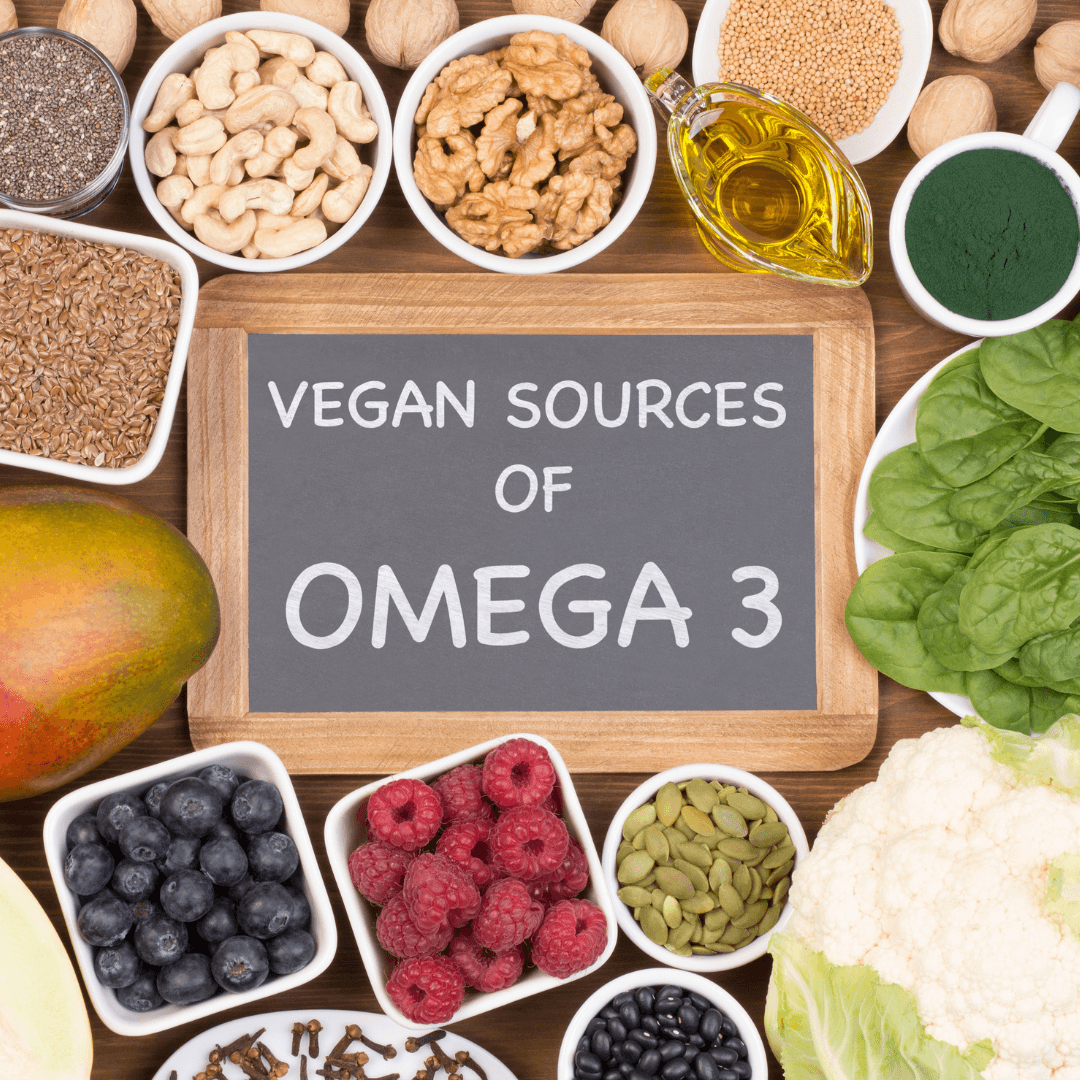
Health Benefits Of Omega-3 Supplements For Vegans
Omega-3 supplements offer various health benefits for vegans, addressing potential nutritional gaps in a plant-based diet. Here are some key health benefits of omega-3 supplementation for vegans:
1. Heart Health
Omega-3 fatty acids, particularly EPA and DHA, support cardiovascular health. They lower blood pressure and blood triglyceride levels and lower the risk of heart disease.
2. Brain Function
DHA is a major component of the brain, and adequate intake is associated with cognitive function and development. Omega-3 supplements may improve memory, concentration, and overall brain health.
3. Joint Health
Omega-3s possess anti-inflammatory properties, which can benefit joint health. Vegan omega-3 supplements may help alleviate symptoms of conditions like arthritis and promote joint flexibility.
4. Eye Health
DHA is also found in high concentrations in the retina. Omega-3 supplementation may contribute to maintaining healthy eyes and reducing the risk of age-related macular degeneration.
5. Mood And Mental Well-Being
Omega-3s are linked to mood regulation and mental well-being. Some studies suggest that adequate omega-3 intake may help manage symptoms of depression and anxiety.
6. Inflammation And Immunity
Omega-3s have anti-inflammatory effects, supporting the body's natural response to inflammation.
This can improve overall immune system function and help prevent chronic inflammatory conditions.
7. Pregnancy And Fetal Development
During pregnancy, omega-3 fatty acids are critical for developing the fetus's brain and eyes. Pregnant vegans may benefit from omega-3 supplements to ensure adequate DHA intake.
8. Skin Health
Omega-3 fatty acids contribute to skin hydration and may help manage skin conditions like eczema. Vegan supplements can support overall skin health.
A well-balanced and diverse plant-based diet that includes omega-3-rich foods like flaxseeds, chia seeds, hemp seeds, and walnuts is essential for overall health, even though omega-3 supplements can be helpful.
People should speak with healthcare professionals to learn more about their nutritional needs and whether supplements are right for them.

Challenges For Vegans In Obtaining Omega-3s
While omega-3 fatty acids are crucial for overall health, vegans face unique challenges in obtaining these essential nutrients.
For example, vegans mainly rely on alpha-linolenic acid (ALA), a form of omega-3 found in plant-based sources like flaxseeds, chia seeds, hemp seeds, and walnuts, while omnivores can get their EPA and DHA directly from fish.
One major obstacle is the deficiency of EPA and DHA in direct sources found in the vegan diet.
Plant foods contain large amounts of ALA, but the body rarely uses this fatty acid effectively to convert it into EPA and DHA.
Several factors, including age, gender, genetics, and dietary composition, can affect how well ALA is converted to EPA and DHA, as the conversion rate is relatively low.
Moreover, some plant-based sources of omega-3s contain a higher ratio of ALA to EPA and DHA. For example, flaxseeds are rich in ALA but contain minimal amounts of EPA and DHA.
This means that relying solely on ALA-rich foods may not provide sufficient levels of the more biologically active EPA and DHA, directly linked to the health benefits associated with omega-3s.
To overcome these challenges, vegans may need to pay careful attention to their omega-3 intake and consider incorporating specific plant-based supplements or fortified foods into their diet.
Algal oil supplements, derived from algae, are an excellent vegan-friendly source of both EPA and DHA.
These supplements offer a direct and reliable way for vegans to ensure adequate levels of these essential fatty acids without relying solely on ALA conversion.
In navigating these challenges, a thoughtful and informed approach to omega-3 intake becomes crucial for vegans seeking to optimize their nutritional profile and support overall health.
Understanding Omega-3 Supplements
Vegan omega-3 supplements, particularly those derived from algae oil, offer a plant-based alternative to traditional fish oil capsules.
Algae oil supplements are sourced from microalgae, the primary producers of omega-3s in marine ecosystems.
This approach eliminates the need to rely on fish as an intermediary source, making it a suitable option for vegans.
The main distinction between fish oil and algae oil supplements is their origin. Fish obtain omega-3s by consuming algae, and the oil is extracted from their tissues.
Algae oil supplements, on the other hand, skip this step, directly harvesting the omega-3-rich microalgae.
This aligns with vegan principles and eliminates concerns about potential contaminants often found in fish, such as heavy metals and environmental toxins.
The two essential omega-3 fatty acids, EPA and DHA, are commonly found in vegan omega-3 supplements.
Algae-derived supplements can provide a comparable and sustainable source of these crucial nutrients without contributing to overfishing or depleting marine resources.
These supplements come in various forms, including capsules and liquid formulations. Algae oil capsules are convenient and easy to incorporate into a daily routine.
As the market for vegan supplements expands, individuals following a plant-based diet have more options than ever to ensure they meet their omega-3 requirements without compromising their ethical or dietary choices.

Effectiveness Of Vegan Omega-3 Supplements
The effectiveness of vegan omega-3 supplements, specifically those derived from algae oil, has garnered support from numerous studies and research initiatives.
Algae-based omega-3 supplements have demonstrated efficacy in raising blood levels of both EPA and DHA, providing a viable alternative for individuals adhering to plant-based diets.
Research indicates that the human body can efficiently convert alpha-linolenic acid (ALA), a plant-based omega-3 found in flaxseeds, chia seeds, and walnuts, into EPA and, to a lesser extent, DHA.
However, the conversion process is not highly efficient, and factors such as age, sex, and overall health can influence its effectiveness.
Algae oil supplements offer a direct and concentrated source of both EPA and DHA, bypassing the need for conversion and potentially addressing concerns related to inadequate intake.
Several clinical studies have demonstrated the bioavailability of omega-3s from algae oil, showing comparable or even superior absorption rates to fish oil supplements.
This suggests that algae-derived omega-3s can effectively raise the levels of these essential fatty acids in the bloodstream, supporting cardiovascular health, cognitive function, and overall well-being.
Additionally, as algae oil supplements do not rely on fish-derived sources, they avoid the risk of contamination often associated with marine-based omega-3 supplements.
This makes vegan omega-3 supplements a safe and reliable option for meeting nutritional needs without compromising health or ethical considerations.
The evidence supports the efficacy of algae-based omega-3 supplements, reinforcing their role as a valuable resource for vegans seeking to optimize their omega-3 intake.
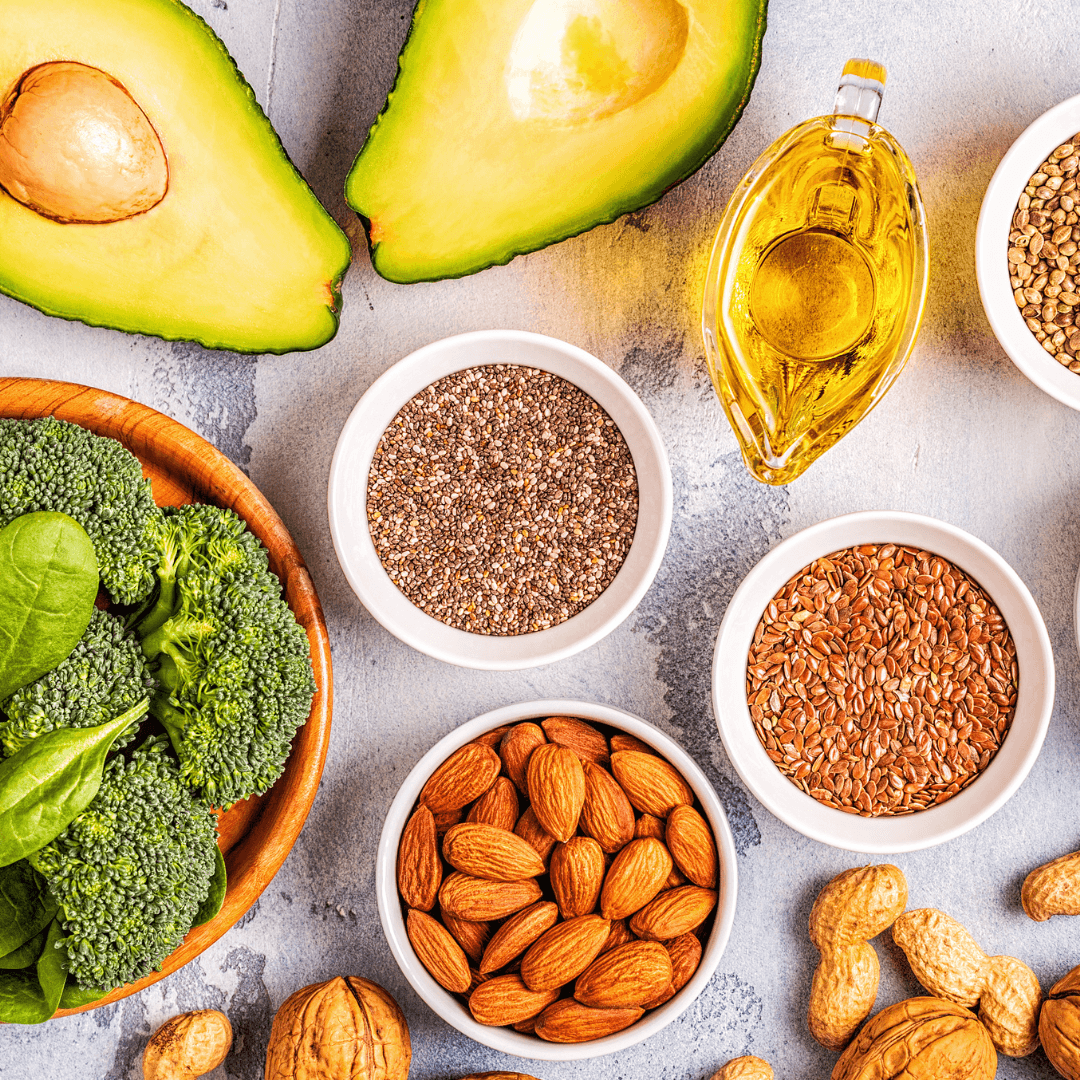
Balancing Omega-3 Intake In A Vegan Diet
Balancing omega-3 in a vegan diet requires strategic dietary choices and, when necessary, incorporating supplements. Here are practical tips to help vegans achieve a well-rounded omega-3 profile:
1. Include Algae-Based Supplements
Algae oil supplements offer a convenient way to increase their omega-3 intake since they directly source both EPA and DHA.
Supplementing with algae-based sources guarantees a consistent supply of these important fatty acids independent of ALA conversion.
2. Incorporate ALA-Rich Foods
While ALA conversion to EPA and DHA is not highly efficient, including ALA-rich foods in the diet is still beneficial.
Walnuts, hemp seeds, chia seeds, and flaxseeds are all great sources of ALA. Consider incorporating these seeds into smoothies, salads, or oatmeal to boost your omega-3 intake.
3. Choose Omega-3 Fortified Foods
Many plant-based foods, such as plant milk, juices, and cereals, are fortified with omega-3s, particularly DHA. Check product labels for added omega-3s to supplement your dietary intake.
4. Eat Algal Oil-Fortified Foods
Some plant-based foods, like certain plant-based margarine, are fortified with algal oil, offering an additional source of omega-3s.
Incorporating these fortified foods into your meals can contribute to a more balanced omega-3 profile.
5. Plan Omega-3-Rich Meals
Designing meals focusing on omega-3-rich ingredients can be key to maintaining balance. Include seaweed, Brussels sprouts, and edamame in your meals, as they contain varying amounts of ALA and other beneficial nutrients.
By combining a thoughtful selection of omega-3-rich foods, fortified options, and, if needed, algae-based supplements, vegans can effectively balance their omega-3 intake.
Experimenting with diverse plant-based ingredients and maintaining awareness of nutritional content empowers individuals to create well-rounded, omega-3-optimized meals within the framework of a vegan diet.

Plant-Based Sources Of Omega-3s
Plant-based omega-3 fatty acids are essential for vegans looking to optimize their nutritional intake. Here are some vegan-friendly sources of omega-3s:
1. Flaxseeds (ALA)
Omega-3 fatty acids, such as alpha-linolenic acid (ALA), are abundant in flaxseeds. Ground flaxseeds are a simple addition to oatmeal and smoothies, and they work well as an egg substitute in baked goods.
2. Chia Seeds (ALA)
Chia seeds are another excellent source of ALA. They can be mixed into yogurt, sprinkled on salads, or used to create a chia pudding for a nutrient-packed snack.
3. Hemp Seeds (ALA)
Hemp seeds are a versatile and nutritious meal addition. Sprinkle them on salads, blend them into smoothies, or incorporate them into energy bars to boost omega-3s.
4. Walnuts (ALA)
Walnuts are a delicious and convenient source of ALA. Snack on a handful of walnuts, add them to oatmeal or include them in salads to increase your omega-3 intake.
5. Algae-Based Supplements (EPA and DHA)
Algae oil supplements offer a direct source of the two important omega-3 fatty acids, docosahexaenoic acid (DHA) and eicosapentaenoic acid (EPA). Supplements based on algae are a vegan-friendly substitute for fish oil capsules.
6. Brussels Sprouts
Brussels sprouts contain ALA and can be a tasty addition to various dishes. Roast Brussels sprouts, add them to stir-fries or include them in grain bowls.
7. Edamame
Edamame, or young soybeans, are a source of ALA. Snack on steamed edamame, toss them in salads or add them to pasta dishes.
8. Soy-Based Products
Certain soy products, like tofu and tempeh, contain ALA. Incorporate tofu into stir-fries or enjoy marinated tempeh in sandwiches or salads.
9. Soybean Oil
Soybean oil is a cooking oil that provides moderate ALA. Use soybean oil for sautéing or as a salad dressing base.
10. Mustard Oil
Mustard oil, derived from mustard seeds, contains ALA. Use mustard oil in cooking or as a flavorful addition to dressings.
11. Spinach
Leafy greens, including spinach, offer ALA. Add fresh spinach to salads, blend it into smoothies, or use it in cooked dishes.
12. Natto
A traditional Japanese dish made from fermented soybeans that contains small omega-3s. Incorporate natto into your diet as a unique source of nutrients.
13. Pumpkin Seeds
Pumpkin seeds, also known as pepitas, contain ALA. Snack on roasted pumpkin seeds or sprinkle them on salads for added crunch.
14. Sacha Inchi Seeds
Sacha inchi seeds are rich in ALA and have a unique texture. Enjoy sacha inchi seeds as a snack, or add them to granola and yogurt.
Including various plant-based sources in your diet can contribute to meeting your omega-3 fatty acid needs.
Aim for a well-balanced and diverse intake of these foods to ensure optimal nutritional benefits.
Considerations And Potential Side Effects Of Omega-3
Although taking omega-3 supplements can be helpful, there are a few things to remember and possible adverse effects:
1. Dosage Considerations
Omega-3 supplements come in various dosages. Choosing a dosage that aligns with your specific health needs and dietary intake is crucial.
The right dosage will depend on your age, health, and eating habits; speak with a healthcare provider.
2. Interaction With Medications
Omega-3 supplements may interact with certain medications, such as blood thinners. You must inform your healthcare provider about any supplements you take to prevent potential interactions.
3. Digestive Issues
When taking omega-3 supplements, some people may get mild digestive problems like bloating or indigestion.
It can help reduce possible gastrointestinal discomfort. Start with a lower dosage and increase it gradually.
4. Quality And Purity
Ensure that the omega-3 supplement you choose is of high quality and purity. Look for products that have undergone third-party testing for contaminants like heavy metals and pollutants.
5. Allergies
Algae-based omega-3 supplements are plant-derived and suitable for individuals with fish allergies.
However, individuals with allergies to specific supplement ingredients (e.g., algae) should carefully review product labels or consult a healthcare professional.
6. Pregnancy And Breastfeeding
Pregnant or breastfeeding individuals should consult their healthcare provider before taking omega-3 supplements, as they play a crucial role in fetal and infant development. Always prioritize safety and individual health needs when incorporating omega-3 supplements.
Consultation with a healthcare professional ensures that supplementation aligns with your overall well-being and complements your plant-based lifestyle.

Navigating Omega-3s For Different Life Stages
As individuals progress through different life stages, their nutritional needs, including omega-3 fatty acids, may vary.
This is crucial during pregnancy and breastfeeding, where omega-3s are vital in fetal brain and eye development.
Pregnant and nursing mothers following a vegan lifestyle should pay special attention to obtaining adequate omega-3s.
While plant-based sources like flaxseeds, chia seeds, and walnuts contribute alpha-linolenic acid (ALA), considerations for supplementing with algae-based DHA and EPA become more prominent during these life stages.
Pregnant and breastfeeding vegans can benefit from consulting healthcare professionals to ensure they meet omega-3 requirements, addressing potential concerns about nutritional adequacy.
Additionally, emphasizing a well-balanced diet rich in omega-3-containing foods and incorporating vegan omega-3 supplements, especially those derived from algae, can be pivotal in supporting the health of both the mother and the developing child.
Understanding the nuanced nutritional needs during these life stages allows individuals to make informed choices, aligning with their values while prioritizing optimal health outcomes for themselves and their growing families.
Future Trends And Innovations In Vegan Omega-3s
As the demand for plant-based nutrition grows, the landscape of vegan omega-3 supplements is witnessing notable innovations and trends.
Technological advancements and sustainable practices are shaping the future of plant-based omega-3 options.
Algae oil, sourced directly from marine algae, stands out as a sustainable and vegan-friendly alternative to fish oil.
Companies increasingly harness biotechnology to cultivate algae rich in EPA and DHA, ensuring a cruelty-free and environmentally conscious omega-3 source.
Additionally, the market is witnessing a surge in omega-3 products fortified with innovative plant-derived sources.
These may include extracts from sea buckthorn, echium seeds, or algal oil blends, providing diverse nutrient profiles.
Sustainable packaging practices are also gaining prominence, aligning with the ethical and environmental values of the vegan community.
Furthermore, ongoing research is exploring novel plant-derived omega-3 sources to expand the options available to vegans.
As the intersection of technology, sustainability, and nutrition evolves, the future of vegan omega-3s appears promising, offering a broader range of choices that cater to diverse preferences and values.
Staying informed about these developments will empower individuals to make conscientious choices in aligning their omega-3 intake with ethical and sustainable considerations.
Conclusion
In conclusion, whether vegans can take omega-3 supplements is met with a resounding yes.
Omega-3 supplementation for vegans is a viable and beneficial option to ensure adequate intake of essential fatty acids.
However, it's crucial to approach omega-3 supplementation judiciously, considering individual health needs and consulting healthcare professionals for personalized advice.
Additionally, maintaining a well-rounded plant-based diet rich in diverse sources of omega-3s contributes to comprehensive nutrition.
As the demand for vegan-friendly omega-3 supplements grows, innovation and research continue to pave the way for sustainable, ethical, and effective options.
With careful consideration and informed choices, vegans can confidently incorporate omega-3 supplements into their dietary regimen, supporting their journey toward optimal health and well-being.
I trust you enjoyed reading the article “Can Vegans Take Omega-3 Supplements?” Please stay tuned. I will be adding more blog posts very shortly.
JeannetteZ
>>>Please click here to read my Vegan Travel Guides To World Destinations<<<
>>>Want To Learn How To Create Delicious, Cruelty-Free, Healthy AND 100% Vegan Meals? Try These Awesome Vegan Cooking Courses With A Free 7-DAY MEMBERSHIP<<<
Your Opinion Is Important To Me
Do you have thoughts, ideas, or questions? I would love to hear from you. Please leave me your questions, experiences, and remarks about the Can Vegans Take Omega-3 Supplements in the comments section below. You can also reach me by email at Jeannette@LivingTheVeganLifestyle.org.
Disclosure
This post may contain affiliate links. I earn from qualifying purchases as an Amazon Associate and other affiliate programs. Please read my full disclosure.
You might also enjoy these blog posts:
Best Vegan Supplements In The UK
Best Vegan Restaurants In Buenos Aires, Argentina
Freshfield Vegan Omega 3 Review
Best Vegan Omega 3 Supplements
All Types Of Vegetarians – An Easy Guide

